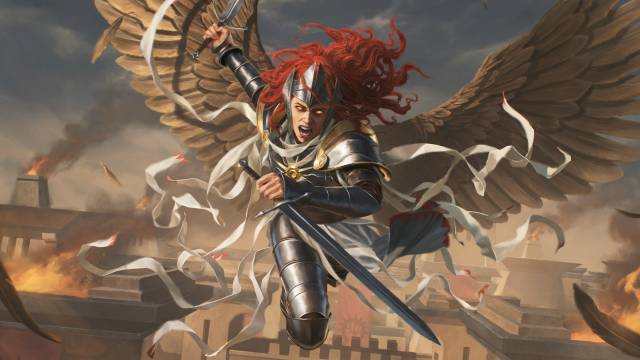An error in judgement earlier this year—when a D&D artist confirmed they had used generative AI programs to finish several pieces of art included in the sourcebook Glory of the Giants—saw Wizards of the Coast publicly ban the use of AI tools in the process of creating art for the venerable TTRPG. Now, the publisher is making that clearer for its other wildly successful game in Magic: The Gathering.
“For 30 years, Magic: The Gathering has been built on the innovation, ingenuity, and hard work of talented people who sculpt a beautiful, creative game. That isn’t changing,” a new statement shared by Wizards of the Coast on Daily MTG begins. “Our internal guidelines remain the same with regard to artificial intelligence tools: We require artists, writers, and creatives contributing to the Magic TCG to refrain from using AI generative tools to create final Magic products. We work with some of the most talented artists and creatives in the world, and we believe those people are what makes Magic great.”
The statement comes after Wizards of the Coast faced backlash this past August, when it was discovered that the D&D sourcebook Bigby Presents: Glory of the Giants contained multiple pieces of art that had utilized generative AI-created assets to “polish” elements of the final work. While in that circumstance Wizards chose to continue working with the artist involved in the pieces, the publisher also established a new set of guidelines “to make clear that artists must refrain from using AI art generation as part of their art creation process for developing D&D art,” as well as re-publishing an updated version of Glory of the Giants to replace the AI-assisted pieces with newly commissioned work.
The wording in the D&D statement is distinctly different to that in the one for Magic: The Gathering, which only says that “final Magic products” cannot use generative AI tools, rather than any point of the creative process as addressed by the publisher for D&D. io9 has reached out to Wizards of the Coast for clarification on whether or not generative AI can be used at any point in the creation of work for Magic: The Gathering, such as prompted text edited by a human writer, or early drafts of art that are then finalized by hand, and will update this piece if we hear more.
The Magic statement also comes in the wake of major layoffs at Wizard’s parent company Hasbro. Last week the Wall Street Journal reported that Hasbro plans to lay off 1,100 staff over the next six months across its divisions in a series of cost-cutting measures, with many creatives across Wizard’s D&D and Magic teams confirming they were part of the layoffs. Just this week, the company faced backlash for opening a position for a Digital Artist at Wizards of the Coast in the wake of the job cuts, which totaled roughly a fifth of the Hasbro’s current workforce across all of its divisions.
The job description specifically highlights that the role includes having to “refine and modify illustrative artwork for print and digital media through retouching, color correction, adjusting ink density, re-sizing, cropping, generating clipping paths, and hand-brushing spot plate masks,” as well as “use… digital retouching wizardry to extend cropped characters and adjust visual elements due to legal and art direction requirements,” which critics suggested carried the implication that the role would involve iterating on and polishing art created through generative AI. Whether or not this will be the case considering Wizards’ now-publicized stance remains to be seen.
Want more entertainment news? Check out when to expect the latest Marvel, Star Wars, and DC releases, what’s coming to cinemas in Australia this year, and everything streaming this month across all platforms. Check out our dedicated Entertainment tab for more.
